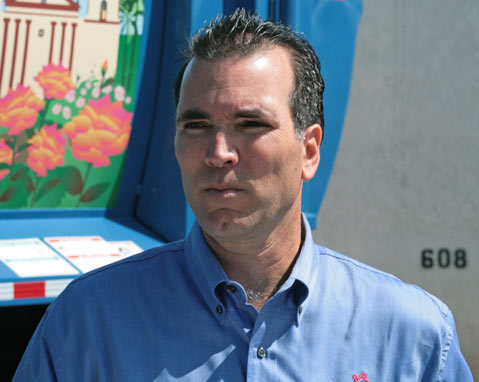Marborg Crushes Allied in Trash Wars
Local Hauler Gets Contracts Worth $45 Million

Tuesday was an excruciating day to be Stephen MacIntosh, Allied Waste’s point person in Santa Barbara’s high-stakes trash war for the hearts, minds, and wallets of South Coast customers. In the afternoon, the county supervisors voted to yank Allied’s long-term contract to haul Noleta’s trash, worth $1.8 million a year, even though Allied offered the cheapest rates. Getting the nod instead was MarBorg Industries, Allied’s archrival. Tuesday evening, the Goleta City Council also voted to deep-six Allied — which had hauled Goleta’s trash for years — again awarding the contract to MarBorg. Combined, the two eight-year contracts are worth about $5.8 million a year. That’s $45 million out of Allied’s pockets and into MarBorg’s. Adding insult to injury, Supervisor Joni Gray curtly rejected MacIntosh’s request that he be allowed nine minutes to make his case to the county board, as opposed to the two minutes allotted all public speakers. MacIntosh then asked for five and Gray held fast. “Two,” she insisted. She did not smile. When MacIntosh stood at the podium, he found himself speaking into a dead microphone.
To endure such abuse, MacIntosh recently left a secure job with the City of Santa Barbara, where for years he spearheaded that city’s recycling efforts with a rare evangelical zeal, to lead an uphill effort for Allied Waste Services, a multi-billion-dollar garbage conglomerate that had never demonstrated much enthusiasm where trash diversion was concerned. MacIntosh pledged to change all that, and for the past six months scrambled to catch up with Mario Borgatello, the head honcho of MarBorg Industries, who for the past 10 years showed how one could make serious money by being green. MarBorg’s track record as a trash hauler and recycler proved too much for Allied to match. Borgatello’s donations to local charities, good causes, and many elected officials didn’t hurt either.
A private consultant hired by the county to weigh the competing proposals ranked MarBorg nine points ahead of Allied. Only on price did Allied beat out MarBorg significantly. But with either company, trash rates will drop. Allied’s bid would save ratepayers $86 a year; MarBorg’s, $57. Where Allied service was ranked good, MarBorg was excellent. On recycling and diversion, MacIntosh talked about all the things Allied would do; Borgatello could talk about all the things MarBorg had already done: invested in a major construction and demolition facility, built a household hazardous-waste recycling facility, and kept the Community Environmental Council (CEC) afloat back in the early days of recycling. MacIntosh packed the supervisors’ chambers with many supporters who sang Allied’s praises as a hauler and a model corporate citizen. Most talked about the value of competition, the need for the South Coast to have at least two viable haulers, and the prospect of a MarBorg monopoly.
As of Tuesday, MarBorg clearly emerged as the dominant player in the South Coast’s lucrative trash business, and Allied was left with only half the City of Santa Barbara. And that franchise — worth $12 million — will soon be up for grabs, and MarBorg has unleashed a full-court press to wrest it away, hiring the acid-tongued Jeremy Lindaman, the political consultant who ran the campaigns of three of the current city councilmembers. At issue now is whether City Hall will expend the funds to hire a private trash consultant to help solicit the most competitive bids, at what cost, and which companies will be allowed to bid. Thus far, city staff has found itself stymied twice in its efforts to hire a consultant.
Some may find the four-dimensional chess of trash politics either boring or impenetrable, or the personal travails of MacIntosh — who once regarded Borgatello as a friend and coconspirator in the effort to keep trash out of the landfill — uninteresting, but Tuesday’s actions will result in a significant expansion in services offered throughout Goleta and Noleta. Additional green waste and recycling containers will be provided at no charge. Bulky items will be picked up twice a year — free of charge — instead of once. There will be curbside recycling for batteries, electronic waste, and even used needles. Trash pickup will now be automated, which means MarBorg will need only one person per truck — the driver — as opposed to two. That cost savings will allow MarBorg to charge less.
MacIntosh was not surprised by how the meetings played out, but he does regret he wasn’t given more time to say his piece. “The meeting was scheduled to last two hours,” he said. “Joni Gray got it done in 56 minutes. Given that we’ve been doing business here since 1973, you’d think they could have deliberated a little more.” Gray acknowledged she may have stepped on some toes. “You probably want to throw rocks at me,” she said to the Allied supporters, “but my job is to run a smooth meeting.”



